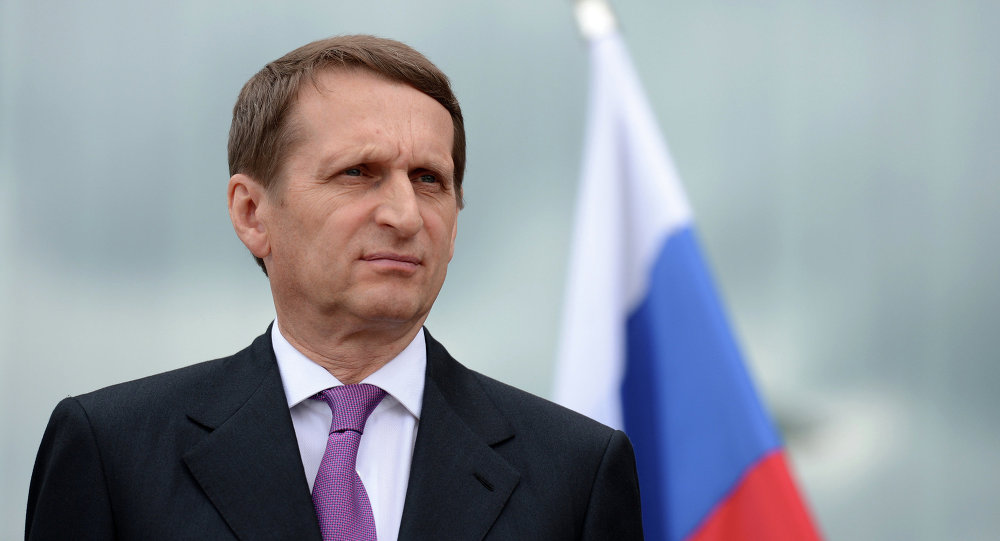www.aljazeerah.info
News, November 2014
Archives
Mission & Name
Conflict Terminology
Editorials
Gaza Holocaust
Gulf War
Isdood
Islam
News
News Photos
Opinion Editorials
US Foreign Policy (Dr. El-Najjar's Articles)
www.aljazeerah.info
|
Editorial Note: The following news reports are summaries from original sources. They may also include corrections of Arabic names and political terminology. Comments are in parentheses. |
Ukrainian Crisis Excuse to Isolate Russia, Says Sergei Naryshkin, Speaker of Russian State Duma
November 26, 2014
 |
|
Ukrainian Crisis Excuse to Isolate Russia: Russian Parliamentarian
Sergei Naryshkin, speaker of the Russian State Duma, believes the Ukrainian crisis is an excuse to isolate Russia.
MOSCOW, November 25 (Sputnik) —
The current crisis in Ukraine has become an excuse for attempts on a grand scale to isolate Russia for the express purpose of international political destabilization, Sergei Naryshkin, speaker of the State Duma, the lower house of Russian parliament, said Tuesday.
"The crisis in Ukraine has turned into an excuse for unprecedented attempts to isolate Russia rather than a lever to activate political dialogue,” Naryshkin said at the international round table "Ways to overcome the crisis of confidence in Europe." He added that those behind these attempts are “interested in destabilizing the international situation and in [creating] a new security crisis in Europe.”
© Sputnik. Evgeny Biyatov Naryshkin: ‘Personal Sanctions’ of EU, US Reduce Possibility of Dialogue with Russia According to Naryshkin, deliberate attempts are being made to hamper an international dialogue, including dialogue between governments. He also suggested that international cooperation is being impeded by the current western sanctions and bureaucracy.
"Sure, the politicians of different countries are seeing what is going on in Ukraine in different ways. But are the authorities of individual states ready to clarify positions in an equitable and mutually respectful dialogue? Regrettably they are not," Naryshkin said.
The Russian politician also noted that opportunities for international cooperation are decreasing at a time when the world must unite to deal with more serious threats like terrorism, drug trafficking and international crime.
Lies, propaganda and especially the selective information campaigns, to which countries have resorted to for the first time in decades, are also impeding international cooperation, according to Naryshkin.
Relations between Russia and the West have deteriorated in the wake of the Ukrainian crisis, as European and US leaders blame Moscow for meddling in Ukrainian affairs – a claim that Russia has repeatedly denied.
New Russian Aid Convoy for East Ukraine Expected to Depart Late November
MOSCOW, November 24, 2014 (Sputnik) –
Russia may send its eighth humanitarian convoy to eastern Ukraine in late November, Russian Deputy Foreign Minister Vladimir Artamonov told RIA Novosti on Monday.
© Sputnik. Evgeny Biyatov Russia Readying New Humanitarian Aid Convoy for East Ukraine: Ministry "We would expect it [to set off] approximately on November 27-28, give or take several days," the deputy foreign minister said.
The convoy is expected to be divided into two, with about 55 trucks to deliver humanitarian cargo to Ukraine's Donetsk region, while the rest of the trucks to head for the Luhansk region.
Russian Humanitarian Convoy Trucks Bound for Donbass Arrive in Rostov Region According to Russian Deputy Emergencies Minister Vladimir Stepanov, the trucks will carry construction materials, which are necessary to restore the regions" destroyed infrastructure and energy supply systems, as well as essentials and foods.
In April, Kiev forces began military operation against independence supporters in eastern Ukraine, who refused to recognize legitimacy of the new government that came to power after a February coup. According to the UN, the confrontation has claimed lives of over 3,700 people. On September 5, the opposing sides reached a ceasefire agreement at a Contact Group meeting in Minsk.
Due to the conflict, Ukraine's southeastern regions are dealing with a severe humanitarian catastrophe, with many citizens struggling without clean water, electricity and other essentials.
***
Share this article with your facebook friendsFair Use Notice
This site contains copyrighted material the
use of which has not always been specifically authorized by the copyright
owner. We are making such material available in our efforts to advance
understanding of environmental, political, human rights, economic,
democracy, scientific, and social justice issues, etc. We believe this
constitutes a 'fair use' of any such copyrighted material as provided for
in section 107 of the US Copyright Law. In accordance with Title 17 U.S.C.
Section 107, the material on this site is
distributed without profit to those
who have expressed a prior interest in receiving the included information
for research and educational purposes. For more information go to: http://www.law.cornell.edu/uscode/17/107.shtml.
If you wish to use copyrighted material from this site for purposes of
your own that go beyond 'fair use', you must obtain permission from the
copyright owner.
|
|
|
|
||
|
||||||


